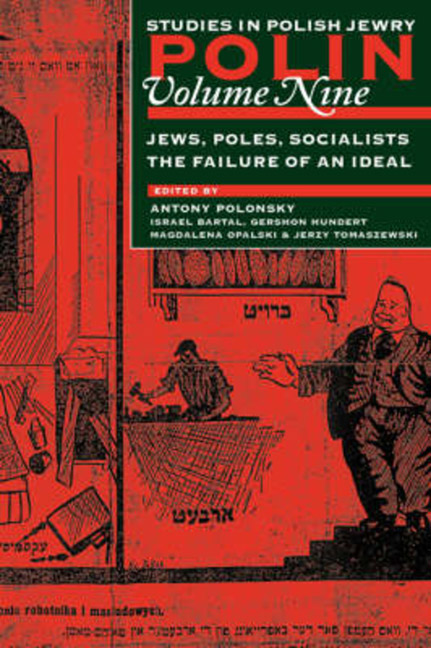Book contents
- Frontmatter
- Dedication
- Editors and Advisers
- Preface
- Acknowledgement
- Polin
- Polin: Studies in Polish Jewry
- Contents
- Note on Transliteration, Names, and Place Names
- Abbreviations
- Introduction
- PART I POLES, JEWS, SOCIALISTS: THE FAILURE OF AN IDEAL
- PART II NEW VIEWS
- PART III REVIEWS
- REVIEW ESSAYS
- History, Drama, and Healing: On the Television Play Ai B, by Harvey Sarner
- Inside, Outside: Interpreting Jewish Difference
- BOOK REVIEWS
- Bibliography Of Polish-Jewish Studies, 1993
- Notes on Contributors
- Notes on Translators
- Glossary
- Index
History, Drama, and Healing: On the Television Play Ai B, by Harvey Sarner
from REVIEW ESSAYS
- Frontmatter
- Dedication
- Editors and Advisers
- Preface
- Acknowledgement
- Polin
- Polin: Studies in Polish Jewry
- Contents
- Note on Transliteration, Names, and Place Names
- Abbreviations
- Introduction
- PART I POLES, JEWS, SOCIALISTS: THE FAILURE OF AN IDEAL
- PART II NEW VIEWS
- PART III REVIEWS
- REVIEW ESSAYS
- History, Drama, and Healing: On the Television Play Ai B, by Harvey Sarner
- Inside, Outside: Interpreting Jewish Difference
- BOOK REVIEWS
- Bibliography Of Polish-Jewish Studies, 1993
- Notes on Contributors
- Notes on Translators
- Glossary
- Index
Summary
The poet and the historian differ not by writing in verse or in prose …. The true difference is that one relates what has happened, the other what may happen. Poetry, therefore, is a more philosophical and a higher thing than history; for poetry tends to express the universal, history the particular. By the universal I mean how a person of a certain type will on occasion speak or act, according to the law of probability or necessity; and it is this universality at which poetry aims in the names she attaches to the personages.
ARISTOTLE, Poetics, ch. 9When I see scholars wrestling with the dust of ancient books and writings in order to resurrect the heroes of history in their true form, in the belief that they are sacrificing their eyesight for the sake of ‘historical truth’, I say to myself, ‘How these learned men go on and on about the importance of their discoveries, and yet they do not deign to observe the simple fact that not every archaeological truth is a historical truth!’ Historical truth is really nothing more than that which reveals the forces at work in human social life. Anything of notable effect upon life is a tangible historical force, and its reality is a historical truth, even if by itself it is nothing more than a figment of the imagination …. And so, when I read the story of the Exodus from Egypt on the first night of Passover, in which the figure of Moses the son of Amram … hovers before me and elevates me to a higher world, in that moment I pay no heed to all those doubts and questions with which the Gentile scholars have beset us about whether there really was such a man as Moses who lived and worked as our people believes he did…. Instead I brush all of them aside with a single curt reply: The primordial Moses, whose reality and essence you seek to clarify, is of no interest to anyone save scholars like yourselves. We, on the other hand, have a different Moses, our own Moses, whose image has been fixed in the heart of our people for generations …. And even if you could prove with absolute certainty that Moses the man never existed …
- Type
- Chapter
- Information
- Jews, Poles, Socialists: The Failure of an Ideal , pp. 247 - 254Publisher: Liverpool University PressPrint publication year: 2008

